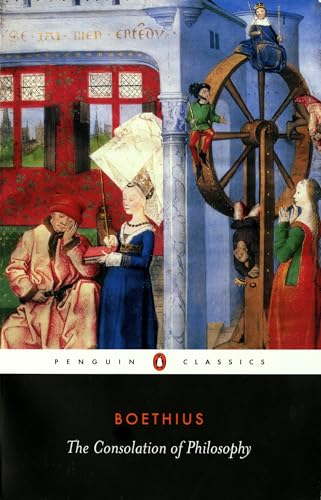The Consolation of Philosophy (Penguin Classics)
Ancius Boethius
BOOK REVIEW

In a world rife with chaos and uncertainty, The Consolation of Philosophy emerges as a beacon of hope and wisdom. Written by Ancius Boethius during his imprisonment around 524 AD, this philosophical masterpiece traverses the tumultuous paths of fortune, happiness, and the essence of existence. It's not merely a book; it's an exhilarating invitation to explore the depths of the human soul and confront the existential crises that plague us all.
Boethius was not just a philosopher; he was a Roman statesman, a man of intellect and influence who found himself ensnared in the trials of life. The irony of his situation-condemned to prison and contemplating his fate-drives the narrative of this profound work. Who among us has not felt trapped in moments of despair? Who hasn't wrestled with the fickle nature of fortune? Boethius, your guide through this philosophical roller coaster, writes not solely from a place of theory but from a visceral understanding of life's caprices.
Drawing on the tenets of Platonic thought, Boethius introduces us to Lady Philosophy, a personification of wisdom who comforts him in his hour of need. Through dialogues that echo like thunderclaps in our conscience, she challenges his despair, reminding him that external circumstances do not dictate our inner peace. Have you ever felt adrift, anchored only by the whims of fate? Lady Philosophy's reflections compel you to acknowledge the control you wield over your thoughts and reactions. 🌊💭
Moreover, The Consolation of Philosophy is drenched in the essence of early medieval thought, grappling with questions that remain profoundly relevant today. This is not just a dusty relic of philosophical inquiry; it is a vivid conversation about the nature of happiness-what it means to live a life of virtue rather than one led by mere pleasure. What do you crave? Is it wealth, social status, or a deep-seated peace of mind? Boethius dares to challenge these desires and pinpoints the heart of true contentment: the pursuit of wisdom and the embrace of virtue.
The text pulsates with emotions, oscillating between despair and enlightenment. It convinces you, almost dragged by its lyrical argumentation, that suffering can lead to profound insights and personal growth. Readers rave about how Boethius's reflections resonate through the ages, as if he were speaking directly to our modern dilemmas. Critics and fans alike have echoed sentiments about the accessibility of his philosophy, noting how he demystifies profound concepts into digestible conversations that anyone can ponder over a cup of coffee or in the solitude of dark, starry nights.
Yet, not all sentiments surrounding the work are overwhelmingly positive. Some argue that Boethius's approach leans too heavily on stoicism, possibly neglecting the rich tapestry of human emotions in the face of such stark philosophical inquiry. Can we truly separate our feelings from our thoughts? This contention invites an ongoing discussion, pushing readers to delve deeper into their interpretations of both philosophy and life itself.
As you journey through these poignant pages, do you feel your understanding of happiness shift? You may find yourself contemplating the true nature of riches, questioning whether they are found in material wealth or in a soul steeped in knowledge and serenity. The brilliance of Boethius lies not just in the eloquence of his prose but in the visceral awakening of your inner critic. You are urged to reflect on your life choices and the very foundation of your happiness.
Let the echoes of The Consolation of Philosophy stir within you. 📖💫 Allow its wisdom to thrum through your thoughts as you navigate your own existence, grappling with uncertainties and the relentless currents of fate. In a time where distractions abound and the noise of the world crescendos, Boethius calls you to retreat into your inner sanctum and reassess what truly matters. You hold the power to find solace amidst the storm. The question is: will you seize it?
📖 The Consolation of Philosophy (Penguin Classics)
✍ by Ancius Boethius
🧾 155 pages
1999
#consolation #philosophy #penguin #classics #ancius #boethius #AnciusBoethius